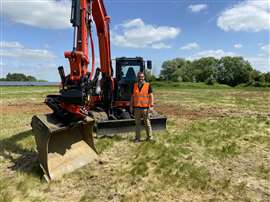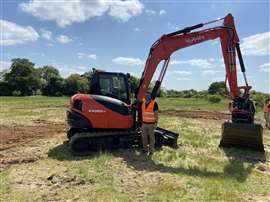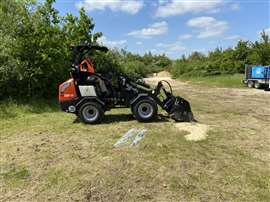Interview: Kubota’s electrification strategy
21 June 2023
Rob White, construction division manager, Kubota UK, talks with Lewis Tyler about electrification, rental demand and new launches
 Rob White at the company’s recent press day in the UK. (Photo: IRN)
Rob White at the company’s recent press day in the UK. (Photo: IRN)
When casting your mind back over the last decade, the shift towards electrification within construction is clear to see.
And, although there has been plenty of developments in that time, the pace in which companies are investing in R&D points to a sector that can expect much more to come in terms of alternative powered equipment.
Driven by demand and, in some cases, local governmental regulations, OEMs are continuing to invest in electric equipment and greener alternatives.
One such company is Japan-based Kubota. The company recently announced the launch of its new RT210-2e and RT220-2e next generation electric compact wheel loaders at a press day in Oxford, England.
While in attendance, I had the opportunity to speak with Rob White, construction division manager, Kubota UK. Given the reason the press was gathered, the first thing I asked White was the company’s approach to electrification and alternative power.
Kubota’s approach to alternative power
“Kubota is a huge corporation and there’s lots of different products and discussions going on,” White tells IRN.
Much of those discussions have been on show in the last year, in which time the company has revealed its new range of electric loaders which are powered by a 48V system with modular 260Ah lithium-ion batteries as standard and can be recharged via a Standard Integrated 40A on-board charger in seven hours.
 Rob White, Kubota’s new divisional manager for construction. (Photo: Kobuta UK)
Rob White, Kubota’s new divisional manager for construction. (Photo: Kobuta UK)
The company also revealed a prototype hydrogen engine and hybrid engine at the ConExpo trade show in Las Vegas earlier this year as it continues on its path to carbon neutrality.
On the company’s strategy, White says there is a belief within Kubota that electrification is the future, alongside other developments in alternative power. White says, “In terms of the strategy for Kubota, we see it as the future, certainly for the smaller machines.
“We’ve also recently introduced our hybrid diesel engines and we’re working on various prototypes and strategies to include that, and we see that as a stepping stone for some of the larger machines before it goes fully electric, very similar to the way that the car industry has gone.”
Elsewhere in its electric portfolio, Kubota used Bauma 2022 to unveil its latest foray into electric excavators with its prototype U36-4 Electric. However, the company has yet to fully enter the field of electric mini-excavators to the same level of other OEMs.
While many may wonder why this is the case, White says the decision to not fully enter the market is down to its considered approach and desire to produce a product that is site ready, a strategy that is not just limited to its excavators; “We’re no strangers to the world of electric mini-excavators. We’ve had 1.5 tonne, 2.5 tonne 3 and 3.5 tonne mini-excavators all shown and previewed to the public so it’s no secret that electric machines are more suited to the smaller machines.
“Kubota are market leaders in mini-excavators, but we don’t see it as a race to be first every time. We would rather take things slower, look at the market and see what’s needed.
“When it’s ready, we will launch it and make sure we’ve got the best product on the market that’s going to be market leading. But let’s say at the moment we know that demand is still relatively small.”
Despite Kubota’s work on electrification, White does point out three key challenges that OEMs are faced with which may be responsible for some reluctance in the industry to fully embrace the technology. Firstly, he points out that the cost of electric machinery can sometimes put buyers off, telling IRN that the “market just won’t absorb that cost yet.”
Secondly, he points towards the infrastructure and charge time of the machines, and thirdly the actual run time of the equipment once charged.
On this, White says that people will need to “change their habits” as there is still an element of run time anxiety among people that are “nervous about the length of time that that machine will actually work for.”
High demand
Although the company may not be fully immersed in electric excavators, it’s still one of the largest producers of diesel-powered machines.
 The KX085-5 mini-excavator from Kubota. (Photo: IRN)
The KX085-5 mini-excavator from Kubota. (Photo: IRN)
White says that demand for the machines, especially the diesel-powered KX085-5 mini-excavator, which was also revealed at its press day and has since made its public debut at Plantworx, has been high.
The machine is the largest currently on offer from Kubota and is described as a “flagship” product by White.
As such, the company is “sold out for the year.” However, he does concede that this is partly down to ongoing supply chain issues.
White said, “We’ve already sold out the entire allocation of the KX085-5. That’s not to say that there’s not any free stock but because of the supply being a challenge, even post covid, we’re still having challenges with components.”
He is also anticipating a high demand from rental companies that Kubota already works with. When asked if he is expecting the likes of Gap Group to enquire about the machine, he says, “Absolutely. The key accounts we deal with directly, Gap being one of them, we’ve already had the conversation about the new product, but obviously dealers have been told about it, they’ve seen it and tried it against the competition this week.”
Regarding rental friendly features of the KX085-5, White says the machine is “easy to use” and “very intuitive.”
“There’s nothing worse than renting a machine and not knowing how to start the engine or how to use different functions, the auxiliaries or other functions,” comments White.
“Quality and reliability is absolutely key, but the other big advantage when it comes to rental is that our machines are actually really easy to use.”
 The RT220-2e electric RT compact wheel loader in action. (Photo: IRN)
The RT220-2e electric RT compact wheel loader in action. (Photo: IRN)
European rental market
Last year, Kubota unveiled plans to spend ¥17 billion (£100m) on its Hirakata Plant, the company’s main mini-excavator manufacturing facility in Japan.
The expansion will see it increase its annual production capability from 48,000 to 78,000 units, helping to meet the “high demand across Europe and North America,” with the assembly line to commence production in late 2024.
Of course, Kubota is already well established within the European market, and currently works with some of the largest rental companies in the sector such as GAP and Boels Rental. For this reason, the company, and White, is well placed to describe the current state of the market.
When asked about the future prospects of the market, White predicts that a drop in the number of companies buying machines could well see rental companies fill the gap; “I’m not predicting another credit crunch like there was in 2009, but there will be a softening in the market.
“When that happens, traditionally rental companies actually benefit because the theory is that if you’re a one man band builder and you’re a little bit nervous about your order book, you start thinking maybe I’m going to rent rather than buy a machine, so even when the market goes down, rental companies actually do better.”
Despite his prediction of a softening, White says that Kubota is still seeing high demand for equipment on a global scale; “The most common question I’m getting asked right now is what’s the market going to be like in 6 or 12 months time, and I wish I had a crystal ball because I’ve never known it to be so unpredictable. It’s definitely feeling like there’s a bit more caution in the market. Having said that, we’re still incredibly busy.
“There’s still a lot of projects on the go, it’s only house building that’s actually gone down in the first quarter.”
STAY CONNECTED



Receive the information you need when you need it through our world-leading magazines, newsletters and daily briefings.
CONNECT WITH THE TEAM









